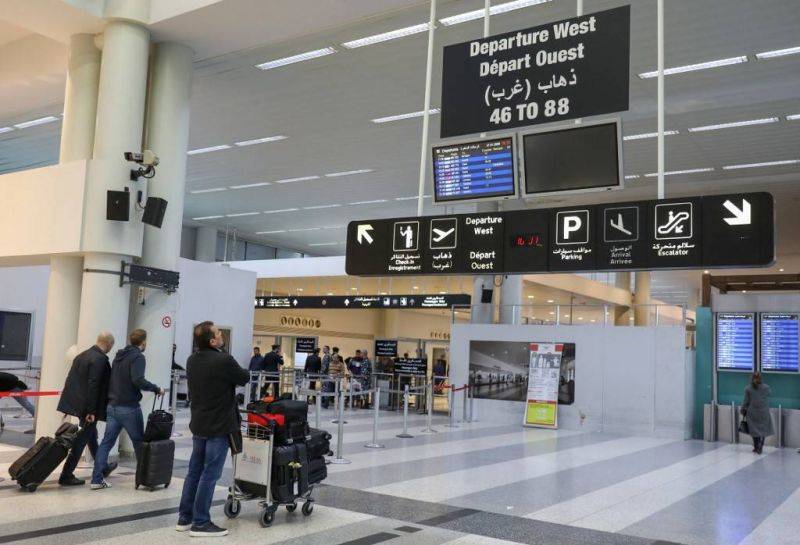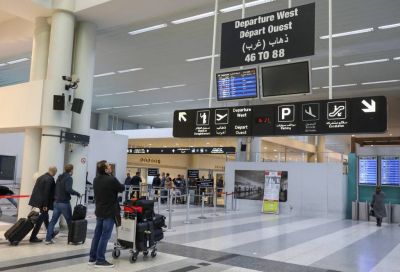
Passengers contemplate the departures board at Beirut airport. (Credit: AFP)
I’m leaving Lebanon. Not for good — I’m not ready to make that decision yet. But last summer, when I couldn’t even imagine how complete our disaster would become, I applied to a literature fellowship in Europe. Two and a half fully funded months in a cabin by a lake, with the foundation paying for the return plane ticket as well. The idea of such fellowships is to have a stretch of uninterrupted time in which to work on your own writing project, without worrying about having to make an income or stressing about everyday things. It’s like a fairy godmother that plucks you out of your real life and places you in the ideal conditions for creativity and concentration.
My acceptance — which I received two weeks after the Aug. 4, 2020, port explosion — couldn’t have come at a better time. Creativity and concentration have been difficult, if not impossible to come by lately. Like everyone else, what little imagination I can still access is fully consumed by the exhausting attempt to secure the most basic necessities. And, like everyone else, I have dreams and ambitions that are a bit bigger than mere survival, that I’ve had to set aside because they’re simply incompatible with life here at the moment.
And so, next month, I’m leaving Lebanon. For a place so unlike Lebanon, so far away from its daily indignities that I might as well be stepping through a portal to an alternate dimension. I should be looking forward to it, and of course I am, but beneath that is a deep sense of dread, as well as a good measure of guilt — that mandatory baggage that everyone has been carrying out of the country with them lately.
I’m afraid of leaving, and afraid of what I might find when I come back.
Because leaving Lebanon, leaving Beirut right now feels like leaving a grievously ill beloved on life support. Their situation is deteriorating fast; any hour they could die. I want to be there for every minute of it; I’ve been sitting by their bed for months now, attuned to their every labored breath, unable to even think about anything else. But I have to go home, take a shower, catch some sleep, recharge a little so that I can come back and be there again. But what happens when I turn my back? What happens if they die while I’m gone? How will I live with myself?
I’m aware of the constraints of this metaphor. A place is not a person. A place does not die between one moment and the next, and I have in fact found myself rolling my eyes angrily at headlines and people declaring this country’s demise.
No, a place is not a person but a complex, shifting creature of memory. That memory resides in the very stone and concrete, is stored in every tree, every turn of weather and seasonal fall of light. In all the things, tangible and intangible, that make up the landscape. And it is the people living there who keep that memory alive, who infuse the place with breath and spirit. The people who love that place give it meaning. Not just the people we love personally, who make up our own orbit. I mean the people we don’t even know, going about their lives in the city, in the country, connected to it with their own private ties of intimacy and familiarity. I mean that the grocer who loves his store, and opens it every morning looking forward to seeing his regular customers, helps keep that corner of the city beating with life. And the customer who greets him every day, and the service driver who carries that customer, and the neighbor who nods at the service driver from his balcony in the quiet dawn as the driver starts his car. All these people, all their interactions with the place and with one another create a powerful force: a complicated, glowing web of love that holds the place together, that connects present to past, person to person, person to place, and place to meaning.
This feeling we have now, that the city, the country is dying seems to me nothing more than the sense we all have of the force of that collective love dimming. The love dims, the web loosens, the place seems to fall apart piece by piece. Of course the love has dimmed, of course we all feel it, in ourselves and in each other. It’s hard to love place when every day it humiliates you so thoroughly. The grocer’s shelves are now bare, his store dark; he has lost the savings he worked his entire life for. He can’t afford to restock or afford the diesel required to keep the lights on. The customer, too, has a hard time paying for both the groceries and the service. The service driver spends entire days waiting in fuel lines, his health suffering from the stress and the heat. The neighbor is preoccupied with securing medicine for his wife, formula for his child.
Like love, like intimacy, humiliation, exhaustion and hopelessness are palpable things. They darken the horizon, blotting out any view of a future. How many more humiliations will have been piled on people by the time I return? How thick and unbearable will the air be with their weight? How unfamiliar will everything feel?
So I’m afraid of what will be lost by the time I return, but I’m also afraid of what I will lose. Because now, what we have instead of a community of love is a community of shared grief. Over the course of the last cataclysmic two years, our identity here has become synonymous with the sufferings of this country. It’s somehow become who we are, who I am. Who will I be away from it? What comfort can I seek from the people I will find around me over there; how can I even introduce myself to them? Commiseration has become the only way we communicate with one another here, but there is a strange, sick comfort in it. Because it is the way we somehow help one another carry our grief, which is too vast and awful to carry on our own. Who will help carry it with me while I’m away? It will be mine alone. I will not see it in the faces and voices of everyone I meet, but I will know it is still out there, gathering force, and it will still be inside me, but strange and formless without the tangible interconnectedness to place and people that gives it, somehow, a kind of meaning.
For all these reasons, I’m afraid of leaving, even as I long more than anything for rest. But above all, I think I’m afraid because I know that when I’m abroad, despite the physical comforts around me, I will be desperately homesick, as I always am when I leave. And I know that the place I will be homesick for has already disappeared.
